2nd August 2014
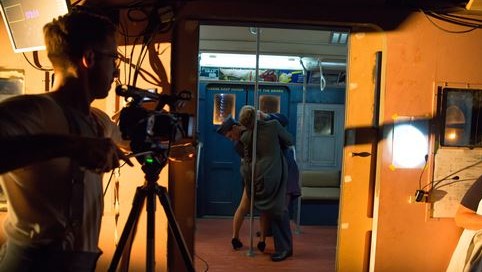
To Cinema 1 at the Barbican for a live stream of The Forbidden Zone from the Salzburg Festival. Written by Duncan Macmillan and directed by Katie Mitchell, this new work premiered last Wednesday, plays Salzburg for another week and then goes to the Schaubuhne in Berlin. (A download of the programme in English is available here.) For one night only, and to one screen only, this innovative relay came to the Barbican as a co-commission with 14-18 NOW, WW1 Centenary Art Commissions. Surprising and fascinating it most certainly was, as well as emotionally engaging.
As background, this video from 59 Productions includes rehearsal footage and an interview with Katie Mitchell:
read more »
29th July 2014
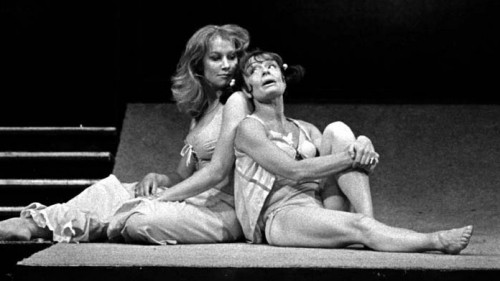
Today I went, by appointment, to what they call a carrel in Rare Books and Manuscripts at The British Library. My carrel was a little room with a glass wall, rather fierce air-conditioning and some headphones. An immensely helpful librarian explained that I should put on the headphones and she would start the playback I had requested. There had been, she admitted, a bit of a panic earlier when they discovered that the tape had been recorded more than forty years ago on a reel-to-reel machine at a very eccentric speed. But all was well. So I closed my eyes, opened my ears, and was transported back to the Aldwych Theatre on the evening of 2 January 1971. Playing out in my head was an ‘as live’ recording of The Two Gentlemen of Verona. read more »
28th July 2014
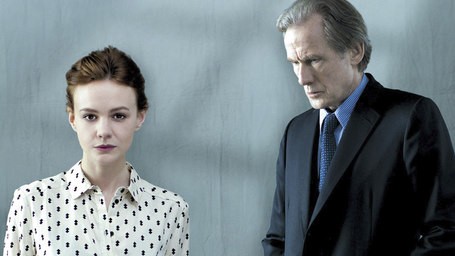
Discussions about adapting stage plays for the screen, whether broadcast live or recorded ‘as live’, have moved on apace over the past couple of months. There have also been a number of further cinema broadcasts, including a successful presentation by NT Live of David Hare’s Skylight, of which Encore screenings are continuing. Below are some recent readings about this question.
• Let’s stop pretending that theatre can’t be captured on screen: this Michael Billington Guardian piece (18 June 2014) is something of a game-changer:
I went this week to a preview of Digital Theatre‘s screen version of Richard Eyre’s Almeida production of Ibsen’s Ghosts: I can only say that it offered an experience comparable to that I had in the theatre… while I remain an evangelist for live theatre, I think it’s time we stopped pretending that it offers an unreproducible event. A theatre performance can now be disseminated worldwide with astonishing fidelity.
• Sir Alan Ayckbourn voices fears over theatre screenings: the playwright offers a note of scepticism; from BBC online, 11 June 2014.
• NESTA research finds that National Theatre Live has no negative impact on regional theatre-going: outline from The Audience Agency on the research undertaken with NESTA; 25 June 2014.
• Research finds that National Theatre Live has no negative impact on regional theatre-going: this is NESTA’s press release; 24 June 2014…
• NESTA Working Paper 14/04: … and this is a download of the report in full.
• How live cinema screenings can help boost live arts audiences: Arts Council Chair Peter Bazalgette adds his gloss to the research; from the Independent, 30 July 2014.
• New work needs to be done before cinema broadcasts bring new audiences to opera: the focus is different, but this English Touring Opera research is also a valuable contribution to the debates; this is their 27 May 2014 blog piece…
• English Touring Opera – Opera in cinemas research: … and this is a download of the paper in full.
• The bitter taste of live screening: Elizabeth Freestone raises some important questions about live cinema broadcasts; from Arts Professional, 5 June 2014.
• Coney’s no island – could streamed theatre let audiences call the shots?: Andrew Haydon for the Guardian on Coney’s interactive theatre experiment Better than Life; 1 July 2014.
• Of Mice and Men to be National Theatre’s first live Broadway screening: meanwhile, NT Live is expanding its geographical reach to take in a New York show; this is the BBC’s 25 July news report. Screening dates for the ‘as live’ recording have still to be announced.
The next RSC Live from Stratford-upon-Avon cinema broadcast is Simon Godwin’s sparkling and totally delightful production of The Two Gentlemen of Verona on 3 September; details here.
26th July 2014

Welcome home – to sunshine, a much-neglected blog and more than 1,700 spam comments that need (rapid) reviewing. Here is a developing list of some of the things I’ve found interesting in the past few days since I have been back from a wonderful time in Italy. With apologies for not giving credit where it’s due for the pieces I didn’t discover myself.
• NOW THEN: a new batch of brilliance from Adam Curtis.
• The down and dirty history of TMZ: a completely compelling profile of the above by Anne Helen Petersen for Buzzfeed.
• The pervasive power of Rupert Murdoch: an extract from Hack Attack by Nick Davies, courtesy of the Guardian.
• ‘Hollywood Exiles in Europe’ – feeling alienated and anxious: Kenneth Turan for the Los Angeles Times on a UCLA season of movies made by those who driven away by the Red-baiting of the 1950s.
• Excerpt from Crying at the Movies: a section of Marion Sprengbether’s ‘film memoir’, published in 2002.
• Insomnia – unbearable lightness: Jonathan Romney for Criterion on the 1997 Norwegian thriller.
• Moonrise Kingdom – Wes in Wonderland: David Bordwell on current notions of auteurism as highlighted by Anderson’s film.
• Hollywood transformed: Tom Shone for the Financial Times on China and the contemporary cinema.
• Edinburgh 2014 – brain benders of the Black Box: Harriet Warman for Sight & Sound at the EFF showcase of experimental moving images.
• Andrew Dickson on Shakespeare in the Wild West: great podcast.
• The Nether “trailer”: a smart interactive experience for the show currently at the Royal Court.
• Mastersinger: Alex Ross profiles Joyce DiDonato for The New Yorker.
• The all-American expo that invaded Cold War Russia: Matt Novak at Paleo-future on the American National Exhibition in Moscow, July 1959.
• Prefab, post fab and just fab: John Grindrod visits Catford’s Excalibur Estate of post-war pre-fabs.
• No moral, no uplift, just a restless ‘click’: Holland Cotter at The New York Times on MoMA’s Garry Winogrand retrospective…
• In transit: … and a very fine Geoff Dyer piece on Winogrand from the London Review of Books archives.
• Musical gold: a fine Rebecca Mead New Yorker piece on investing in Stradivari.
• Brief lives: Luke McKernan on writing for the Oxford Dictionary of National Biography (which I’ve also been doing recently)
• At the crime scene: a remarkable London Review of Books essay by Adam Shatz on the sado-masochism (and more) of Alain Robbe-Grillet.
• What is the great American novel?: for TLS Sarah Graham reviews Lawrence Buell’s The Dream of the Great American Novel.
• Big air: The New Yorker‘s Ben McGrath at the X Games.
• BBC R&D at the Commonwealth Games 2014: the future of broadcasting is here – or, at least, it’s in Glasgow.
• Beyond digitisation – new possibilities in digital art history: James Cuno for Iris at The Getty.
• Citizen Bezos: Steve Coll on Amazon for The New York Review of Books.
• Understanding the participatory culture of the web – an interview with Henry Jenkins: … by Trevor Owens at a Library of Congress blog.
22nd June 2014
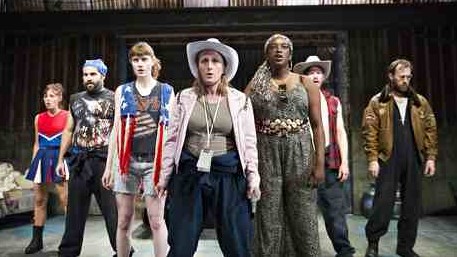
• From the Bard to Bart – how Mr Burns challenges our common culture: Mark Lawson at the Almeida (above, Tristram Kenton’s Guardian image of the production).
• Recovered, discovered and restored – DVDs, Blu-rays and a book: a round-up of recent releases by Kristin Thompson.
• Charles Barr on Ealing 13: the best writer on British film considers Network’s most recent release of rarities from the studio.
• The forgotten great theatres of London: Joe Carroll at the Londonist.
• ‘Peter Brook is an exceptional human being’: Rupert Christensen for the Telegraph.
• Life and death: John Grindrod on his parents and the demolition of Taberner House in Croydon.
• Save the Warburg library!: for The New York Review of Books, Anthony Grafton and Jeffery Hamburger.
• Think big. Build big. Sell big: Carol Vogel on Jeff Koons for The New York Times.
• Garry Winogrand, street photographer – a retrospective, in pictures: Jonathan Jones introduces a glorious selection.
• Beyond Pong – why digital art matters: an illustrated Guardian essay by James Bridle.
• Inside the color factory – my chat with a photo colorizer: Matt Novak interviews Dana Keller.
• The internet with a human face: Maciej Ceglowski’s talk from Tellerrand last month.
• Big Bang Data: site (in English) for an important exhibition in Barcelona.
• E-books vs paper?: Julian Baggini for the Financial Times.
• Inheritance: Ian Parker profiles Edward St Aubyn for The New Yorker.
• Paupers and richlings: Benjamin Kunkel on Thomas Piketty, from London Review of Books.
• The literature of the second gilded age: for LA Review of Books, Stephen Marche on Thomas Piketty and contemporary literature.
• Football considered as one of the arts: from Luke McKernan.
18th June 2014
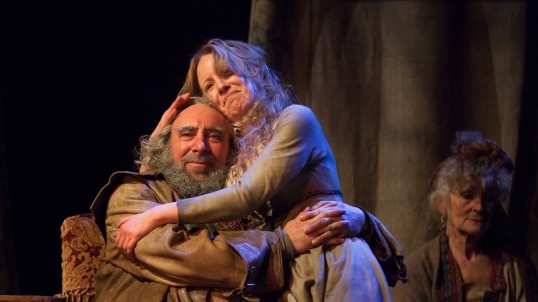
If it’s Wednesday, it must be the live broadcast day of the Royal Shakespeare Company’s Live from Stratford-upon-Avon broadcast of Henry IV Part II. We’re back at the Boar’s Head tavern, which is where Falstaff, Hal and the company acted out the banishment of the fat knight in Part I (below). Prepare to have your hearts broken tonight…
15th June 2014
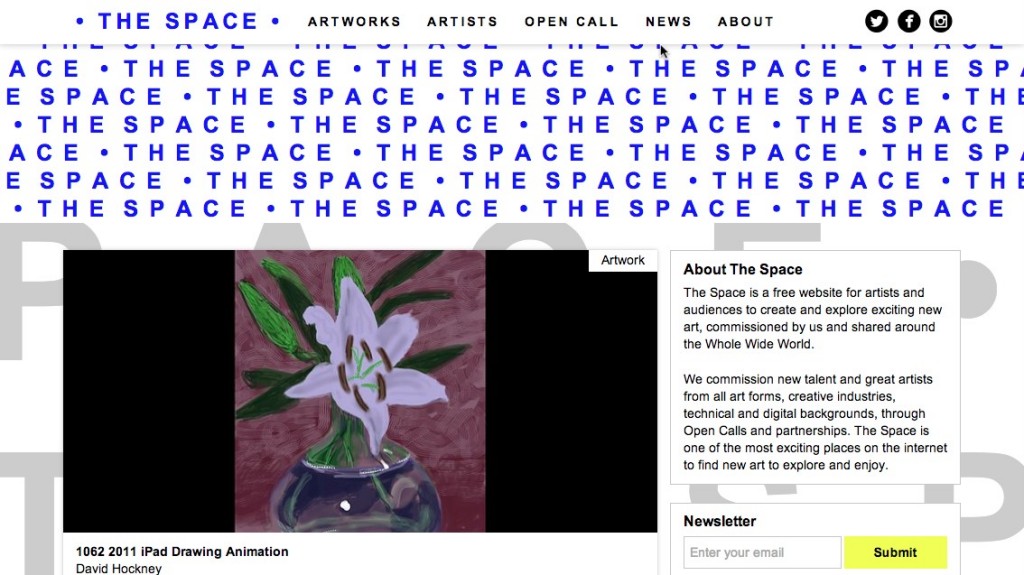
• The Space: welcome!
• The 1940s are over, and Tarantino is still playing with the blocks: David Bordwell on Quentin Tarantino, Walt Disney, and Henry James.
• Are digital cameras changing the nature of movies?: part one (of three) from Andrew O’Hehir at Nautilus.
• Finding the method in the medieval theatre’s madness, from the Guardian.
• Interview – veteran theatre director Peter Brook: from the Financial Times.
• Director Maria Aberg: ‘We have a responsibility to consider gender-blind casting’: The White Devil director interviewed at What’sOnStage.
• She speaks: Dan Hutton in the RSC rehearsal room for Midsummer Mischief.
• Going live – Philip Auslander and the theatre of liveness: Erin Sullivan at Digital Shakespeares.
• On criticism – the Guardian years: pieces on theatre criticism at Postcards from the Gods.
• Inheritance: Ian Parker profiles Edward St Aubyn, The New Yorker.
• Reading – the struggle: Tim Parks, New York Review of Books.
• On Margate sands: Luke McKernan goes back to Margate to see Mondrian.
• The urge to strangle: T J Clark on Matise, London Review of Books.
• Nicholas Serota on Cy Twombly’s gift to Tate: from the Financial Times.
• The Ladybird book of postwar rebuilding: from Dirty Modern Scoundrels.
• How state of the art engineering is revolutionising the museum experience worldwide: from Architizer.
• Jennifer in paradise: the world’s first Photoshopped image, from the Guardian.
• Inaugural lecture – A Decade in Digital Humanities: from Melissa Terras.
• A world digital library is coming true!: Robert Darnton for The New York Review of Books.
• The trials of Entertainment Weekly: one magazine’s 24 years of corporate torture: Anne Helen Petersen for The Awl.
• All of Bach: every week you can find here a new recording of one of Bach’s 1080 works.
• Yesterday: a new Haruki Murakami story, courtesy of The New Yorker.
PS. The above is a try-out for a new Sunday Links format, stripped-down, lacking credits and thanks, but perhaps sustainable. We’ll see.
12th June 2014
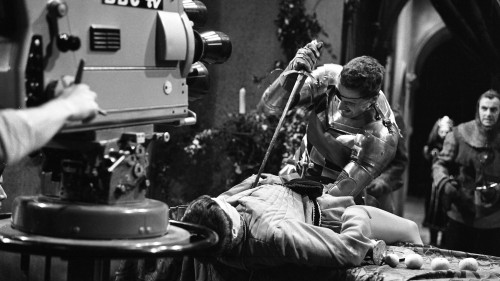
Regular readers will know that I am involved with the Screen Plays research project, based at the University of Westminster and generously funded by the Arts and Humanities Research Council. The project is documenting the history of theatre plays on British television and early next year will publish a database of information about all three thousand-plus television productions of plays originally written for the theatre. Screen Plays has just announced the call for proposals for its concluding conference in London on 20 February 2015, and that seemed like an appropriate prompt for a handful of links about the topic.
• The Screen Plays blog
• Call for proposals – Theatre and Television: Adaptation, Production, Performance
Last month Screen Plays organised a successful BFI Southbank season, Edwardian Drama on the Small Screen, which was accompanied by a half-day symposium.
• Introduction to the season
• My Guardian article about television productions of the plays of Bernard Shaw (above).
• Dr Billy Smart’s symposium keynote, Edwardian values, 1970s television: John Galsworthy on BBC1
• Notes from the symposium
Associated with the Screen Plays project is the Illuminations DVD release of the 1960 BBC cycle of Shakespeare History plays, An Age of Kings (above). Details of the DVD box set are here, the 10 5-star Amazon readers’ reviews are here, and this is one of the trailers that we have produced for the release:
9th June 2014
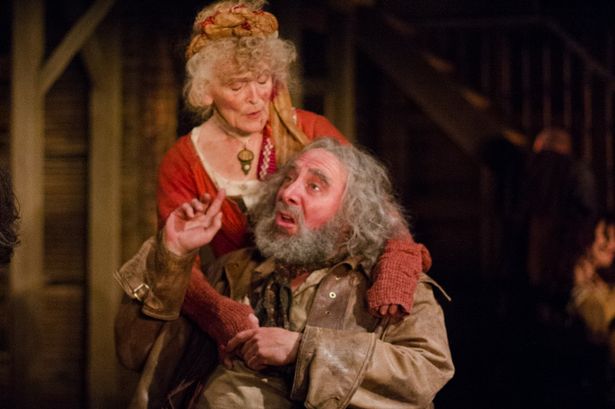
I am in Stratford-upon-Avon for today’s first camera rehearsal for the RSC’s live cinema presentation of Henry IV Part II on 18 June. One of the things that frustrates me about these broadcasts is that they rarely get reviewed or discussed as examples of live cinema. Part I on 14 May, however, attracted at least three substantial responses – from the Birmingham Post, from the blog But madnorthnorthwest and from academic Dr Peter Kirwan at The Bardathon:
• Richard Edmonds’ 5-star review for the Birmingham Post:
[I]n this skilful filming of the play not a word was missed, articulation was nigh perfect, the ends of lines were not dropped and so we heard our Shakespeare clearly which is surely the point of the exercise. The other great thing which a seat in the stalls cannot give us, is the intimate close-up. In the film of the play such as this, you can see the pores on an actor’s skin, almost feel his emotional suffering as the camera closes in on his eyes, and you can see the work of the costume department in detail.
• The blog Butmadnorthnorthwest:
After the successful broadcast of Richard II last year, the RSC is now continuing with Henry IV (part 2 follows in June). Started off with a charming and informative interview of Gregory Doran (NTL, you might want to take notes of how these are done. Kudos to Suzy Klein.) who admitted having unsucessfully looked for his Falstaff until Ian McKellen called his attention to the fact he was actually living with him.
• Peter Kirwan at The Bardathon:
This was the first of the ‘Live From Stratford-upon-Avon’ events that I’ve attended, the live screenings from Stratford modelled on the NT Live series that will, hopefully, by 2020 see the complete works of Shakespeare broadcast internationally from the RSC’s main stage. If the RSC wishes to remain competitive in a new market then it’s a necessary step, and it was a pleasure to see John Wyver’s team doing an extraordinary job with the filming. Despite the obvious awkwardness of filming a production performed on a thrust stage, cameras captured the fine detail that characterises Doran’s work, from the apparently suspended crown which dominated the stage at the production’s opening to the detail of Falstaff’s reaction to his dismissal by Hal.
I would be delighted to learn of any other detailed reviews, whether positive or negative.
PS. for the rationale for my new approach to the blog, go here.
8th June 2014

Although there is no sign of this here, I have been thinking a lot about a new direction for this blog. I have remarkably downtime at the moment and I’m all too aware that I am not posting regularly. The next RSC Live from Stratford-upon-Avon broadcast is coming up fast – Henry IV Part II on Wednesday 18 June. There are other broadcast projects underway, plus I am researching and writing articles on, among other topics, live cinema, Henry Moore, Shakespeare on television and Ken Russell. And I am doing my best to work on the data entry for the Screen Plays database which needs to be complete by the end of the year – and we still have a long way to go. Finding the moments to post here as I have in the past has simply become harder in recent weeks. So I am going to try something a little different. Please bear with me over the coming days as I work out quite how it should work.
I intend to post something here every day – but not to feel that I have to craft an article for each entry. Rather, many of the entries will just be a link or several such or a video or a book I’m reading, with a line or two of commentary. And I’ll keep the past seven days active in a separate updated entry – and then ‘retire’ entries eight days or older into the archive. You’ll get the hang of it, I hope. Anyway, here goes…
Sunday 8 June
Previously on the blog… I used to compile a Sunday links section of things that I had found interesting during the previous week. I miss this, as I think one or two of you do also, and I am hoping that my blog makeover will offer some of the links that I would have previously highlighted. So to begin on this new path I am going to point you towards a terrific series of recent posts on one of the blogs that I admire the most, Kristin Thompson and David Bordwell’s Observations on film art.
In April and May David Bordwell authored a wonderful series of posts about film reviewing in the United States in the 1940s, ’50s and ’60s. They are full of richly interesting ideas about the cinema, writing and the culture of America. He intends to pull these together into an e-book but in the meantime you can read them here:
• Otis Ferguson and the way of the camera, 20 November 2013
David Bordwell characterises this piece as the ‘prologue’ to the series. He reflects on the writings of the film critic of The Nation between 1934 and 1942.
• The Rhapsodes: Agee, Farber, Tyler and us, 26 January 2014
Introducing James Agee, Manny Farber and Parker Tyler…
I’m captivated by all three. None holds me hostage, though; I write as an enthusiast but not a promoter. What attracts me now, in tandem with the book I’m writing on Hollywood in the 1940s, is what they did in their first decade. Although many readers didn’t notice, these three made writing about American film exuberant and important. They raised it to a level of frenzied acuity that it had never enjoyed before. They helped create, by the delayed action I sketched earlier, the modern institution of movie criticism, with all its virtues and excesses. In the process, they forged some original ways of thinking about American cinema.
• Agee & Co.: a newer criticism, 9 February 2014
Leftist ideas about popular culture – and especially Hollywood – in the 1940s…
James Agee, Manny Farber, and Parker Tyler […] wrote criticism with a zany gusto that nobody else imagined possible. They didn’t telegraph their punchlines; sometimes you couldn’t be sure that there was a punchline, and sometimes there seemed to be too many. As for popular culture: They seemed, with reservations, to like it a lot. They liked being unSerious, which only lent greater oomph to the moments when gravity was demanded.
• James Agee: All there and primed to go off, 23 February 2014
On Agee on Chaplin and John Huston, and on Walker Evans too.
It’s terribly easy to be sentimental about Agee, and almost as easy to be hard on him. (Brutality, as Stroheim and Griffith knew, has its sentimental side.) But I think that reading him can do something rare in film criticism: He calls you to your best instincts. His dithering can be frustrating, and he often snaps open too many pipes in the sonorous organ of that style.
• Manny Farber 1: Color commentary, 17 March 2014
• Manny Farber 2: Space man, 23 March 2014
We’re so attuned to late-phase Farber that turning to this hero’s apprentice work may seem to court disappointment. But from the start the writing is racy and engaging, and not so densely impacted as in his late phase. Moreover, he has long been considered our critic most sensitive to the look of the movies. By rummaging first in his youthful art reviews, we can get a better sense of exactly what his criticism owes to the visual arts, modernism in particular. The result, which I’ll present in the followup entry, wasn’t quite what I’d expected.
• Parker Tyler: a suave and wary guest, 2 April 2014
Tyler tries something different [from Agee and Farber]. He’s not a realist but a surrealist. What Agee and Farber praised as “accuracy” or “authenticity” scarcely concerns him. And story–at least, the story the film pretends to be telling–doesn’t matter to him so much. The very first chapter of his first book is titled, ‘The Play Is Not the Thing.’
• The Rhapsodes: after lives, 20 April 2014
If there hadn’t been films that pushed the boundaries of cinematic storytelling, even the cleverest reviewers couldn’t have written so fruitfully. Without Sturges and Welles, Huston and Wyler, Hitchcock and Wilder, Wellman and Walsh, Lang and Preminger, Mankiewicz and Val Lewton; without perversities like The Portrait of Dorian Gray and Salome Where She Danced (above) and Turnabout; without ambitious pictures like Citizen Kane and The Story of GI Joe alongside dozens of sturdy programmers, the Rhapsodes would have had little to work with. The cascade of overpowering, exuberant, piercing, and crazy films of the 1940s surely pushed them to go all out. Great criticism can flourish, it seems, when there is great cinema.









